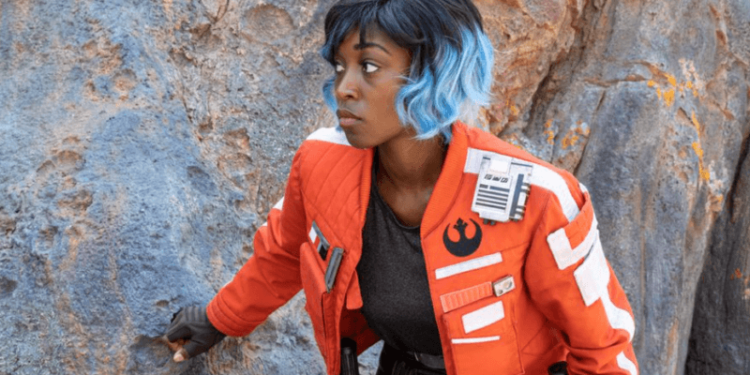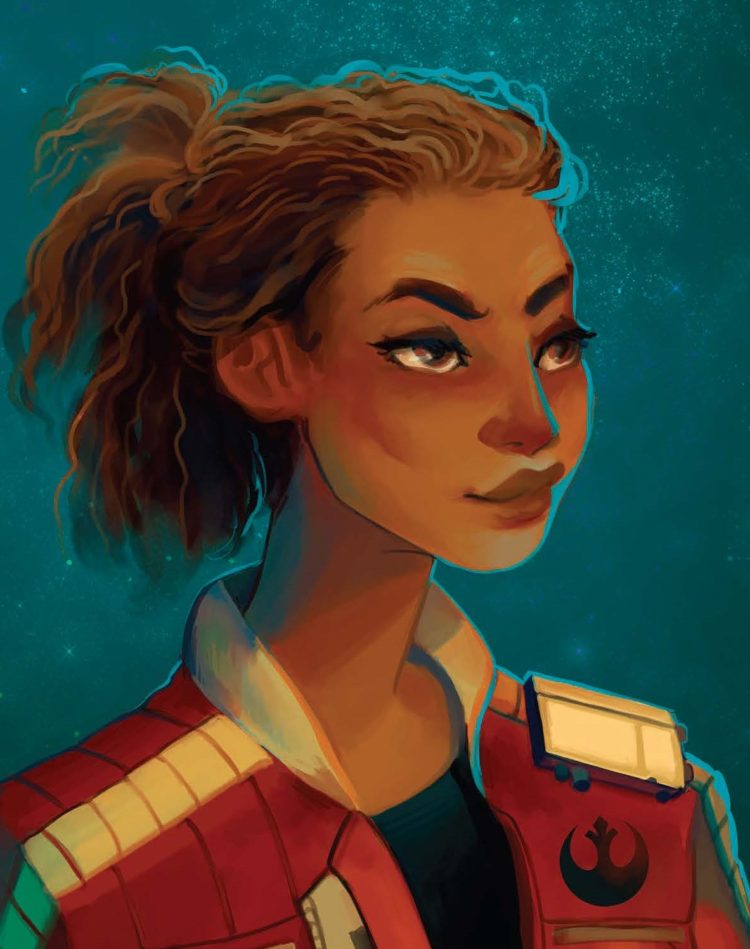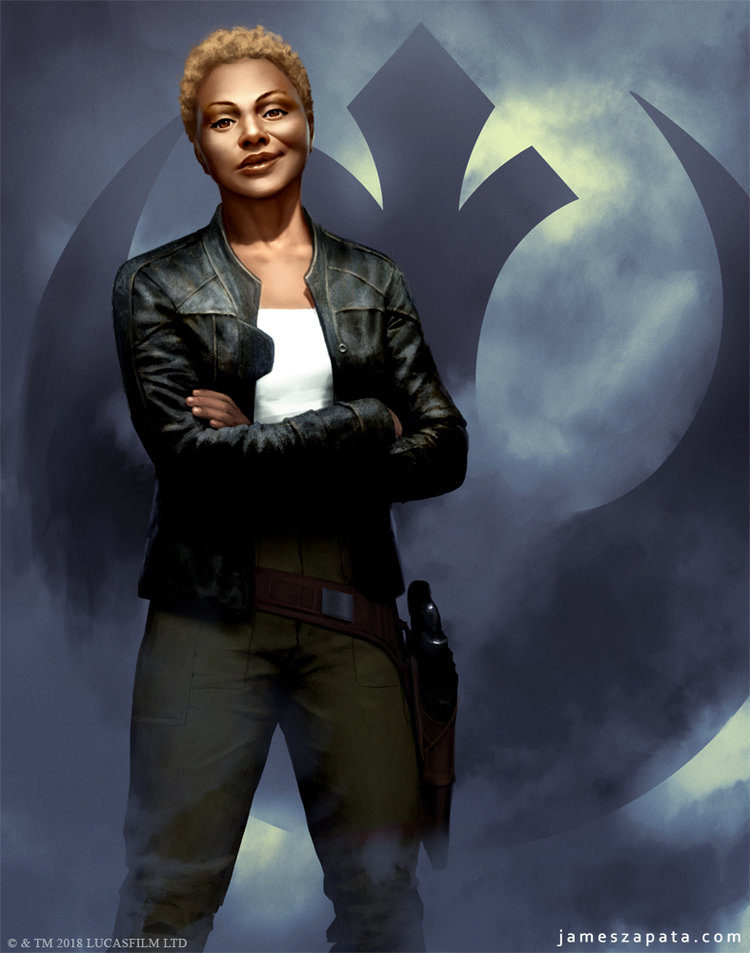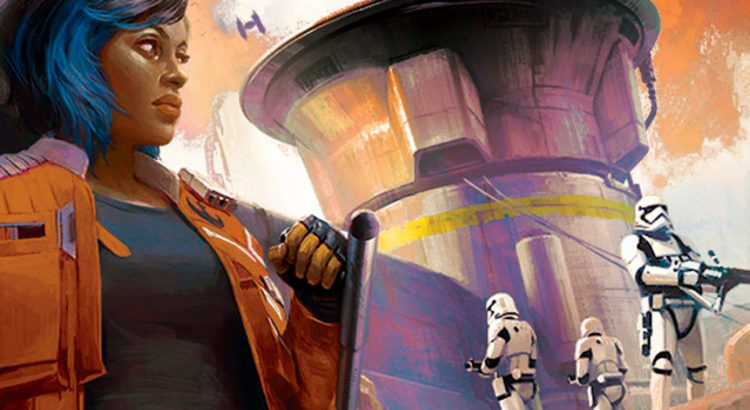Ben Wahrman: On the day Star Wars – Galaxy’s Edge: Black Spire was released, there was a good deal of hullabaloo on Star Wars Twitter about it, including a lot of posts by the author Delilah S. Dawson during a promotional tour through Galaxy’s Edge in Orlando and other nearby locations. But one string of tweets by Elizabeth Schaefer, Del Rey’s lead Star Wars editor, caught a lot of attention and a lot of appreciation. In her short thread, Schaefer notes that it was an idea of Dawson’s that the main character of Black Spire, Vi Moradi, would “come out” as asexual. Schaefer shared her appreciation for that decision and direction for the character, as she herself is asexual and feels the representation is much needed. Considering the traction her tweets gained, she was not alone in that.
After I saw these posts, I knew that my fellow contributor Abigail would have feelings about Vi and who she is. And I wasn’t wrong! I had a lot of thoughts and feelings of my own, so we decided to jointly discuss both of those things and talk about Vi as both a character and as a representative of the asexual community, as well as the wider issue of the representation of asexuality in Star Wars and media at large. We’ll begin by talking about our introductions to Vi before the advent of Black Spire.
When I read Phasma, Vi stood out to me as a character that a lot of work and heart had been poured into. For a book that was ostensibly all about, well, Captain Phasma, the team of Vi Moradi and Captain Cardinal stole it from her almost wholesale, despite them being more of a factor in the framing story than in the main flashback narrative of the book. Vi always struck me as a charming, fun character and I certainly hoped to see more of her after Phasma, but I never would have guessed that she’d wind up with such a large presence now, a featured character at the theme park and with a whole novel to herself.
Abigail Dillon: Having not read Phasma right away, my first introduction to Vi Moradi was with Alex Marshall-Brown’s portrayal at Galaxy’s Edge. The description of her that was being used as a snapshot introduction – a description which I later learned came from Dawson herself – definitely caught my attention: “like a female Poe Dameron: humor, ego, and talent, but with an added dash of James Bond.” This has been a type of character I’ve rarely seen a woman play, a sort of swashbuckling pulp hero, facing danger with a smile on her face and quip on her lips. The only other character that comes to mind is Marvel’s Agent Carter. Seeing Vi in action, both in improvised fan interactions and the scripted showdown with the First Order, solidified her as a new favorite of mine. I read Phasma specifically to catch up with Vi before Black Spire came out.
I’ve talked before on Eleven-ThirtyEight about what asexual representation means to me. I’m so used to having to piece it together, both in Rey and in Omi, and even then it can be suddenly taken away from me. To have a character that is explicitly asexual is an actual relief, and that the character is Vi Moradi is…well, I’m outright honored.
Having recently realized you were ace, Ben, what does representation mean to you? Does it feel new to look for this sort of representation, or does it put previous preferences of characters/tropes/etc. into perspective? For example, when I still thought I was straight, I preferred the Ghibli film Nausicaä of the Valley of the Wind to the critically acclaimed Princess Mononoke because Nausicaä didn’t have the heroine fall in love. I wanted that representation, but I just didn’t know what it was called.

Ben: That’s a good question, and a great point. I think more than anything realizing that I am asexual put a lot of previous thoughts that I’ve had and preferences for certain types of stories and characters into much clearer perspective. Perhaps it’s even one of the main reasons I’m drawn to Star Wars in the first place; Star Wars is one of the more generally asexual film franchises out there (though it is certainly not aromantic). George Lucas has always been clear that he made his films for a young audience, and like a lot of kids’ media it winds up being fairly chaste. But to have a character explicitly confirmed as asexual, not just treated as such, is huge.
Abigail: It’s definitely important to differentiate between aromanticism and asexuality. I think for a lot of people, specifically those who are neither aro nor ace, both get conflated. Let’s Talk About Love by Claire Kann is a good example of an asexual character who is biromantic, but other asexual characters that I’ve encountered are either specifically aro and ace (Immoral Code, Dread Nation) or they’re just listed as “ace” and the “aro” is assumed (Once & Future). I’m not entirely sure which category Vi would fall into. The text of Black Spire seems to support aromanticism, but Schaefer in her tweets only refers to asexuality.
On my own part – as both aromantic and asexual – I don’t mind too much when the two are conflated. In fact, I even use that assumption frequently when I come out to people, mainly because I’m really not ready to discuss the different forms of attraction when I don’t experience either. Nevertheless, automatically assuming that one means the other can be hurtful to those who are aromantic or asexual, but not both. I don’t know where you are on the romantic-aromantic spectrum, but if you’re willing to share, do you have an opinion on this?
Ben: It’s harder for me personally to really have found my place on the romantic-aromantic spectrum. I’ve never been in a relationship or even dated. That said, it’s hard for me to know where aromanticism might start versus where social awkwardness and lack of experience end. I’m certainly not against romance in media, and romantic relationships between characters don’t rub me the wrong way. Perhaps that’s something that I will need to explore more personally at some point in the future, but I can honestly say that it’s never really come up previously.
Neither asexuality nor aromanticism is widely understood, but being aromantic specifically is a really hard thing to quantify if you yourself are not aromantic. For a lot of authors or other creators, it may be easier to make asexual characters aromantic as well so they cover both bases, provided that they are conscious of that sort of thing. Even if someone doesn’t know the term “asexual”, they may have a character opposed to the ideas of romance and who doesn’t experience sexual attraction to anyone because it’s much harder to write a character who is one and not the other. Someone who is aromantic but not asexual might be portrayed as a love-em-and-leave-em sort of predator if written poorly, while someone who is asexual but not aromantic can seem pitiful or pathetic, pining after others without ever taking what everyone assumes is the culminating step of a relationship.

Having read Black Spire and getting a greater idea of who Vi is, she does seem to lean toward the aromantic side; she is very warm and friendly towards those she is fond of and has reason to like, but that warmth is never rooted in anything physical; her gradual persuasion of Cardinal in Phasma certainly wasn’t romantic or in any way a seduction, and likewise her helping him manage his complicated feelings about her in Black Spire is gentle but firm despite their traumatic past. I may be a poor judge of this sort of thing, since up until a short while ago this wasn’t something that I looked for in media period, but she does read as aromantic to me as well.
Abigail: Stepping outside of aromantic and asexual representation for a moment, Vi’s persuasion of Cardinal/Archex is, to me, an important display just for women in general. We have a lot of fiction in which women sway men one way or another in terms of good/evil through attraction. For example, the femme fatale archetype in which the hero is influenced by his attraction to her, and he must fight against it in order to remain good. Satine Kryze is arguably on the other end of the spectrum. Obi-Wan’s respect and attraction to her makes him act closer to the Jedi Code than he does at most other points in The Clone Wars. I’ve seen a few people who don’t even like Obi-Wan say he’s more tolerable in the Satine episodes, and I’m going to be arrogant enough to attribute that to my favorite female character in Star Wars…though I do have to admit that Vi Moradi is gaining ground on Satine fast.
So for Vi to convince Cardinal through reason and persuasive arguments is something that we don’t usually get to see in fiction. Rarely are women allowed to be the intellectual equals or superiors of male characters, and any “advantage” women may have is frequently attributed to the mysterious “feminine intuition”. Vi is intuitive, but she’s also trained and studied and has experience. She’s the whole package of what has normally been allotted to a male hero.

In fact, thinking back on all the examples of asexual characters I provided above, most of the explicit asexual representation I’ve seen has been women. For me, that’s significant. Until Rey, all our major female Star Wars characters either had their arcs defined by romance (Leia, Padmé, Satine, Ventress) or still had an aspect of romance to their journeys (Ahsoka). Both Rey and Jyn are a part of popular ships, and Daisy Ridley has been fielding constant questions about who she’s going to end up with: Finn, Poe, or Kylo. So to have a woman who not only doesn’t have a love interest, but is also guaranteed not to get one, feels almost like freedom to just enjoy Vi. That I don’t have to wait for the moment where she is defined by or has discovered herself through romance or sex, as if she was incomplete without it.
That is coming wholly from my perspective as a woman. Is there a different type of reaction that you have, seeking representation as an asexual man?
Ben: My reaction is similar to yours, absolutely. Far too often there are fictional women whom I would love to love, except that their stories are entirely bound up in their love lives, either in the context of the story or in what the fans of that character want to happen, or both. Having this set in ink and paper frees Vi from the ship wars and other things that typically surround female characters who have the sort of charisma and fanbase that Vi has. Vi doesn’t have that hanging over her. She’s an enjoyable, fun, interesting and engrossing character and I can tell that Delilah Dawson loves to write for her, and I hope she continues to be written for a long time. While I would like to see a confirmed asexual male character at some point in the future, I do celebrate Vi for who she is and what she means to our community.
It could be a much wider discussion to talk about how this relates to male characters, but I’ll touch on a bit of my feelings for a moment. To my knowledge, there hasn’t been an asexual male protagonist in these sorts of franchise works like Star Wars, and the ones that do exist tend to get adjusted or adapted differently in different mediums. I mean, Jughead Jones from Archie Comics is asexual per several of their writers, and the TV adaptation Riverdale made him straight, or at least demisexual. Sherlock Holmes in the original books is uninterested in relations of any kind, but adaptations have varied wildly on that front. Plenty of other male characters have existed without a sexual drive to their portrayal, but few if any have ever been as explicitly noted as Vi is, or they’ve been portrayed as cold, unfeeling, or even outright villains.
I will be interested to see how far up the corporate chain this portrayal makes it, if the word from on-high makes it that Vi should not have a love interest if/when she makes other appearances. Considering that she’s the mascot character for Galaxy’s Edge, she’s become one of the most visible Star Wars characters who hasn’t made a film appearance (yet, hopefully), but with the word of her asexuality coming from Delilah Dawson and Elizabeth Schaefer at the novel level, would someone adding her into a comic or a TV show or even a film stay true to that portrayal? I hope so, I dearly hope so.


2 thoughts to “Aceing It – Vi Moradi and Queer Representation”
Comments are closed.